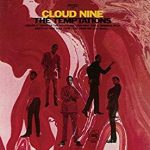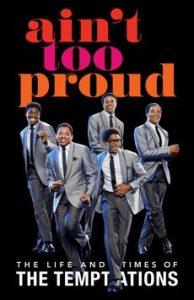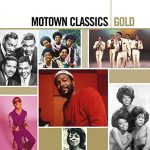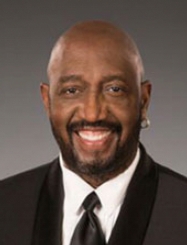The Temptations are a true American treasure, with an astounding catalog which includes “The Way You Do the Things You Do”, “My Girl”, “Get Ready”, “Ain’t Too Proud to Beg”, “Cloud Nine”, “Ball of Confusion (That’s What the World Is Today”, “Just My Imagination (Runing Away With Me)”, and “Papa Was a Rollin’ Stone”. They formed in 1960 and went on to became one of Motown’s most successful groups, selling millions and millions of records.
Otis Williams is the only surviving founding member of The Temptations, and with his bandmates is still out capturing the magic sound of yesteryear. This interview was for a preview article for noozhawk.com for the concert by The Temptations on 4/12/19. It was done by phone on 3/26/19.
Jeff Moehlis: Thinking back to the beginning of The Temptations, when did you first realize that something magical was happening?
Otis Williams: Wow… At first we just wanted to sing. It just so happened that all of us were six-footers, and we moved well. I guess when we started working in the places in and around Detroit, and saw the reactions from the audience, in particular the ladies. We thought, “OK, they must like what we do.” Like I say, all five of us were really tall and the way we were moving. So it started back then when we started playing the clubs in and around Detroit.

JM: I think it’s fair to say that The Temptations’ signature song is “My Girl”. What do you remember about recording that song, and at the time did you have any idea that it would become the timeless classic that it is?
OW: First and foremost, Smokey [Robinson] saw us perform in a very popular club in Detroit called The 20 Grand, and after the show he came backstage and was complimenting us on how good the show was. Then he looked over at David [Ruffin] and said, “I have a song for you.” And us being cocky, we said, “Bring it on! We can sing anything!” And Smokey brought us “My Girl”.
We rehearsed it. We went to The Apollo, The Miracles and The Temptations, and in between shows he would rehearse us doing it. When we went back to Detroit to record it, we went in and put the voices down, and then Paul Riser added the strings and the horns that gave it a whole other kind of daylight, meaning the song itself with the strings added on it. I came up to the control room where Smokey was sitting there recording the strings and horns, and then I said, “Smokey, I don’t know how big a record this is going to be, but I think this going to be a huge record.”
That was ’64 when we recorded “My Girl”. They released “My Girl” at the end of December 1964. In February of ’65, we were back at The Apollo and “My Girl” had sold over a million records, and Berry [Gordy] congratulated us by sending a telegram, as well as The Beatles sent us a telegram congratulating us. So I had a feeling about that. It’s one of our most popular recordings ever.
JM: What was it like working with Smokey Robinson back then?
OW: Oh, Smokey’s always been a gem of a person. He’s a sweetheart of a person, aside from being one of the most talented songwriters. He’s just always been Smokey, in the great wonderful sense. He’s one of those special, unique kind of people that you run across during your lifetime and you can’t think anything bad about them. He’s just always been a wonderful spirit.

JM: The song “Cloud Nine” was another milestone for The Temptations, and a bit of a change in direction for the band. What inspired that change in direction?
OW: Before “Cloud Nine” it was pretty ballads like “Please Return Your Love To Me” and “I Could Never Love Another” and “I Wish It Would Rain”. But we changed everything when we started out with “Cloud Nine”. We just got on a roll with Psychedelic Soul for the next five years or so. “Cloud Nine” was our first Grammy, Motown’s first Grammy, that we had won.
“Papa Was a Rollin’ Stone” almost didn’t get recorded, because we were tired of singing that kind of Psychedelic Soul. We wanted to get back to the up-tempo funky grooves, the pretty ballads that we were known for. But Norman [Whitfield] was so persistent about us doing it that he was going to make sure that it was going to be a hit. So we went into the studio and recorded it, and then Norman did his producer’s thing and added all the wonderful accoutrements that he added to it. When it came out it raced up the charts and I have two Grammys because of “Papa Was a Rollin’ Stone”. I have a total of five Grammys.
JM: What was Norman Whitfield like as a person and as a producer?
OW: Norman was a wonderful spirit. He could be very egotistical, but then again sometimes you need that ego when you’re in this business. But he was a wonderful fellow. You know, we grew up together. He was playing tambourine for Popcorn and the Mohawks and I was in The Distants. We both were 19 years old at that time. So to trailblaze from that point on all the way up until when he came over to Motown…
I must say this about Norman. I told Berry [Gordy] this last week at the opening of our show in New York – I said, “Out of all the producers at Motown, including the great Smokey Robinson and the great Holland-Dozier-Holland and Ashford & Simpson, all the notable producers, Norman Whitfield was the only one that stepped out of character.” He said, “You’re right, you’re right.” When you look at the body of work that Holland-Dozier-Holland did, and Smokey Robinson, and Ashford & Simpson, they didn’t produce the kind of music that Norman became really noticed for. Norman was just one of those kind of guys that would be that kind of daring. So, it was a great ride.
JM: I find it amazing that there was a period of time when you had both Smokey Robinson and Norman Whitfield essentially competing to write the best songs for you. I guessing that was a good position for you to be in?
OW: Well, that’s what Motown was really built on – competitiveness. We thrived on it. Motown thrived on it. That’s what Berry liked to see, that kind of fervor between his artists, between his songwriters, between his producers. It would, in most cases, bring out the best. So Norman and Smokey were vying for the continued recording of us.
Smokey was on a roll then, because he had recorded “The Way You Do the Things You Do”, “I’ll Be In Trouble”, “My Girl”, “Since I Lost My Baby”, “Get Ready”, so he was really on a hot streak with The Tempts. But Norman had something else in mind – that was “Ain’t Too Proud To Beg”. So Berry told Norman, “Look, Smokey has been producing The Tempts. We’re going to ride that one on out. But if ‘Get Ready’ doesn’t crack the Top Ten, we’ll go with you, Norman.” “Get Ready” was a big hit, but it didn’t crack the Top Ten, so that’s when Norman Whitfield got the shot with “Ain’t Too Proud To Beg”, and from that point on we rolled with Norman for the next eight or nine years.

JM: You mentioned the musical, “Ain’t Too Proud”, that just opened on Broadway last week. How exciting is that for you to have that on Broadway?
OW: That is one of the wildest dreams that I thought I would never have. When you think back about how we started off, we mainly wanted to make records and make money and sing to the girls, and things of that nature. To come from that all the way to now – The Tempts have been together for 59 years – and now my life story has gone to Broadway and it is being received magnificently well, I never would’ve imagined that.
I always give thanks to God first and foremost, because of what I’ve gone through and been able to survive. I’m the last man standing, and it is truly a blessing to be able to witness my life and The Temptations’ lives on Broadway, and to have been received so wonderfully well. The reviews have been off the chain. Everybody just loves this play.
I had a man tell me last Thursday, “Mr. Williams, you’re another kind of guy, to open up your life story for the world to see some of the things you’ve gone through. It’s an amazing gesture.” I said, “I guess I am, for telling it the way it really was.” It’s just wonderful to see my life story on Broadway.
JM: Of course Berry Gordy had Motown: The Musical, which was on Broadway also. Did you happen to see that, and if so, what did you think of it?
OW: Yeah, I saw it when it came out on Broadway. It was good. It was hard for Mr. Gordy to try to get all that he could get in within two hours. Because to tell the story of Motown in a real sense you needed a lot more time than two hours. He was trying to get The Tempts in, The Supremes in, Smokey in, as much as he could. So it was good – I enjoyed it.
JM: What was Berry Gordy like as a boss when The Temptations were having all the hits?
OW: Back in the early ’60’s when things started jumping at Motown, I think it caught Mr. Gordy by surprise, because who ever would’ve thought that a two-story family flat on North Grand Boulevard housing all those talented people would become so well-received worldwide. You have to remember that Berry was a songwriter first. He wrote hits for Jackie Wilson, and he wrote hits for Marv Johnson and Barrett Strong. So when Motown really started taking off he had to switch hats from being a creative person to being a business person. Berry would tell you that, because things started happening so quick that he just had to stay on top of his business. Motown was growing with a quantum leap. It’s something that he adjusted to.
But he was a wonderful spirit. I wouldn’t say anything bad about him because I can’t. I mean, business being business you can always find fault with certain things, but all in all Berry was magnificent. I think thank God for letting me be at that place and time.
JM: What advice would you give to an aspiring musician?
OW: You have to stay focused, you have to stay dedicated. There are going to be some knocks and bumps along the way. That gives credibility for once you achieve your goal. Like I tell people, in life you’re going to get more “no’s” than “yes”. But when you get that “yes”, it makes those “no’s” really worthwhile because you appreciate it much better. Anything of value, it’s not going to come easy. It ain’t supposed to come easy. You should be willing to somewhat be baptized in fire, and understand the dues that you have to pay. Because if you got it as easy as a lot of them would like to have it, it has no purpose. You take it for granted. It won’t last long. You just have to bear in mind that it’s going to come with a certain amount of sacrifice.
JM: After David Ruffin was fired from the band, he would show up to the concerts and jump up onstage and sing. When you were up there and that happened, what was your reaction?
OW: Well, you know, we just continued doing what we were up there to do. But it was kind of unsettling, because he refused to accept that we were letting him go. At the time we had Dennis Edwards in the group. But we stayed the course, and after a while David got the gist that it was over. “You had your shot, you messed up, and we’re moving on.” It was just business as usual, you know, continuing doing what we were doing. We were riding another kind of wonderful spirit because we had hits with Dennis Edwards. But we got past it, and he understood that he was no longer in the group, so he settled into doing his solo act. And that was it.

JM: A couple years ago I went to the Motown Museum in Detroit, and really enjoyed it. I was amazed by the amount of history in that place. You were one of the creators, and were part of that history. Do you find it amazing when you look back at The Temptations and Motown in general, just the amount of great music that came out of Hitsville U.S.A.?
OW: Like I have often said, and I will continue to say, that little two-story family flat that you were in, that was no happenstance about Motown coming along in Detroit in that two-story family flat during the ’60’s, which has been noted as the most tumultuous decade within the last 100 years. For that company and that house, with all those talented people – songwriters, producers, engineers, the whole lot – to make such profound music during those troubled times, that was God’s doing. That company was supposed to come along at that time, because there was so much upheaval going on in the world. The music that came out of Motown was like a soothing ointment to a troubled soul. I look back at it now, and that was something that was destined to be, for Motown to come along during the ’60’s.
JM: Amen. Thanks for chatting, and thanks for all the music.


Discussion
No comments for “Interview: Otis Williams”